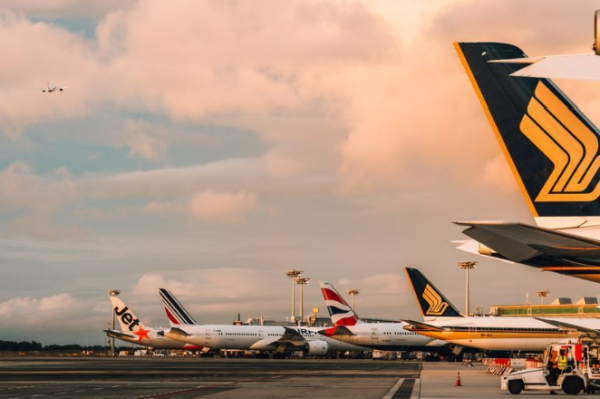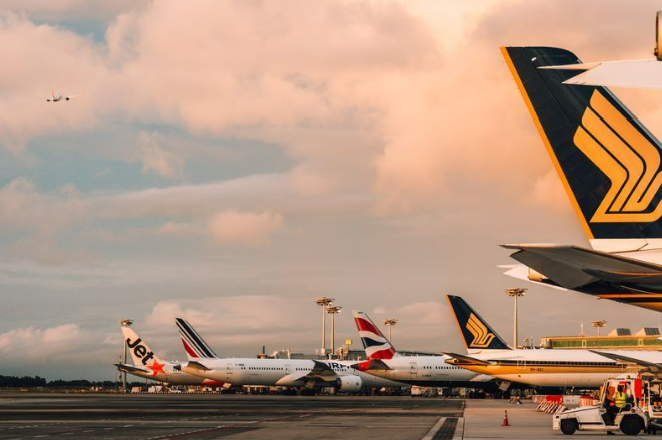SINGAPORE, 3 February 2023: Singapore Changi Airport handled 32.2 million passenger movements in 2022, reaching almost half of the traffic in 2019, before the onset of the Covid-19 pandemic.
Aircraft movements, which include landings and takeoffs, totalled 219,000, 57.2% of 2019 levels[1]. Airfreight throughput[2] registered 1.85 million tonnes for 2022, a year-on-year decline of 4.8%.

In 2022, all regions registered strong recovery in passenger traffic, with North America even slightly exceeding pre-Covid levels on a full-year basis and Southwest Pacific, South Asia, and Europe, each reaching two-thirds of 2019 traffic. Closer to home, Southeast Asia has also seen a robust pickup in traffic following the region’s reopening, closing out the year with a new high of two million passenger movements in December 2022, representing over three-quarters of December 2019 traffic.
Changi Airport’s top five passenger markets for the year were, in order, Australia, Malaysia, Indonesia, India and Thailand. Similar to 2019, Kuala Lumpur, Bangkok and Jakarta were Changi Airport’s three busiest routes in 2022[3]. The Singapore-Kuala Lumpur route is currently the world’s busiest international route based on seat capacity[4].
On the cargo front, cargo flows dipped slightly against the backdrop of global economic uncertainty and inflationary pressures. Changi’s top five air cargo markets for the year were, in order, China, Australia, the US, Hong Kong and Japan.
Strongest traffic in December
Passenger traffic continued to grow throughout 2022, reaching a high in December with 4.62 million passenger movements recorded. This was 72% of Changi Airport’s traffic in December 2019. The busiest week of the year (12 to 18 December) saw more than 1.07 million passengers passing through Changi’s terminals, or 82% of the weekly average in 2019. For the month, aircraft movements registered 25,400, reaching 76% of pre-Covid levels. Compared to December 2021, airfreight throughput fell 17.3% to 153,000 tonnes.
Among Changi’s top 10 markets, South Korea saw passenger traffic grow beyond pre-Covid levels in December 2022, driven in part by additional capacity from Changi’s airline partners, including new airlines T’way Air and Air Premia on the Singapore-Seoul route and Scoot plying the new Singapore-Jeju route.
Enhancing connectivity
In 2022, Changi Airport welcomed eight new airlines. There were seven passenger airlines – Aircalin, Bamboo Airways, Cambodia Airways, Citilink, HK Express, Thai Vietjet Air and T’way Air – and one freighter operator Atlas Air. Four new passenger city links were established for the year – Jeju (South Korea), Nouméa (New Caledonia), Pune (India) and Sibu (Malaysia).
As of the first week of January 2023, 96 airlines operate over 5,600 weekly scheduled flights at Changi Airport, connecting Singapore to 143 cities in 48 countries and territories worldwide. This is 82% of Changi’s pre-Covid connectivity.
Strengthening partnerships
With border restrictions lifted and safe management measures eased earlier in the year, CAG also reinstated various industry events to reconnect with trade and airline partners. These include the Let’s Talk Cargo event held on 10 March and the Changi Airline Awards held on 4 May, where CAG took the chance to thank trade and airline partners for weathering through tough times with Changi.
In August, CAG welcomed the partnership between DHL Express and Singapore Airlines to operate five Boeing 777 freighters out of Changi Airport, flying on routes between the US and Singapore via points in North Asia and Australia. The first two aircraft began operations at Changi Airport in 2022, strengthening the Changi air cargo hub by facilitating more express volumes between the USA and Asia Pacific via Singapore.
Changi Airport’s passenger, aircraft and airfreight movements for 2022
|
Month |
Passenger Traffic |
Aircraft Movements |
Airfreight Throughput |
|||
|
Number[5](thousand) |
Recovery[6](%) |
Number (thousand) |
Recovery5(%) |
Tonnes (thousand) |
Change[7](%) |
|
|
January |
720 |
12.7 |
12.1 |
37.2 |
169 |
16.1 |
|
February |
703 |
13.7 |
10.9 |
36.3 |
137 |
10.4 |
|
March |
1,140 |
20.3 |
13.2 |
40.7 |
152 |
-3.4 |
|
April |
1,930 |
34.6 |
15.1 |
47.9 |
152 |
-1.8 |
|
May |
2,470 |
45.6 |
17.1 |
54.0 |
153 |
-3.9 |
|
June |
2,930 |
50.3 |
18.4 |
58.6 |
163 |
1.5 |
|
July |
3,300 |
55.8 |
20.3 |
62.6 |
163 |
-0.2 |
|
August |
3,320 |
56.3 |
20.4 |
63.1 |
153 |
-7.7 |
|
September |
3,420 |
62.6 |
20.4 |
65.5 |
154 |
-10.0 |
|
October |
3,690 |
65.3 |
21.8 |
68.2 |
152 |
-16.3 |
|
November |
3,960 |
69.3 |
23.7 |
74.8 |
151 |
-15.0 |
|
December |
4,620 |
72.0 |
25.4 |
76.0 |
153 |
-17.0 |
|
Total |
32,200 |
47.2 |
219 |
57.2 |
1,850 |
-4.8 |
Top 10 Passenger Markets for Changi Airport[8]
|
|
2022 |
2019 |
|
1 |
Australia |
Indonesia |
|
2 |
Malaysia |
China |
|
3 |
Indonesia |
Malaysia |
|
4 |
India |
Australia |
|
5 |
Thailand |
Thailand |
|
6 |
Philippines |
India |
|
7 |
Vietnam |
Japan |
|
8 |
United Kingdom |
Philippines |
|
9 |
Korea |
Hong Kong |
|
10 |
Japan |
Vietnam |
Top 10 City Routes for Changi Airport7
|
|
2022 |
2019 |
|
1 |
Kuala Lumpur |
Kuala Lumpur |
|
2 |
Bangkok |
Bangkok |
|
3 |
Jakarta |
Jakarta |
|
4 |
Manila |
Hong Kong |
|
5 |
Sydney |
Denpasar |
|
6 |
Denpasar |
Manila |
|
7 |
Melbourne |
Tokyo |
|
8 |
Ho Chi Minh City |
Taipei |
|
9 |
Seoul |
Ho Chi Minh City |
|
10 |
London |
Sydney |







